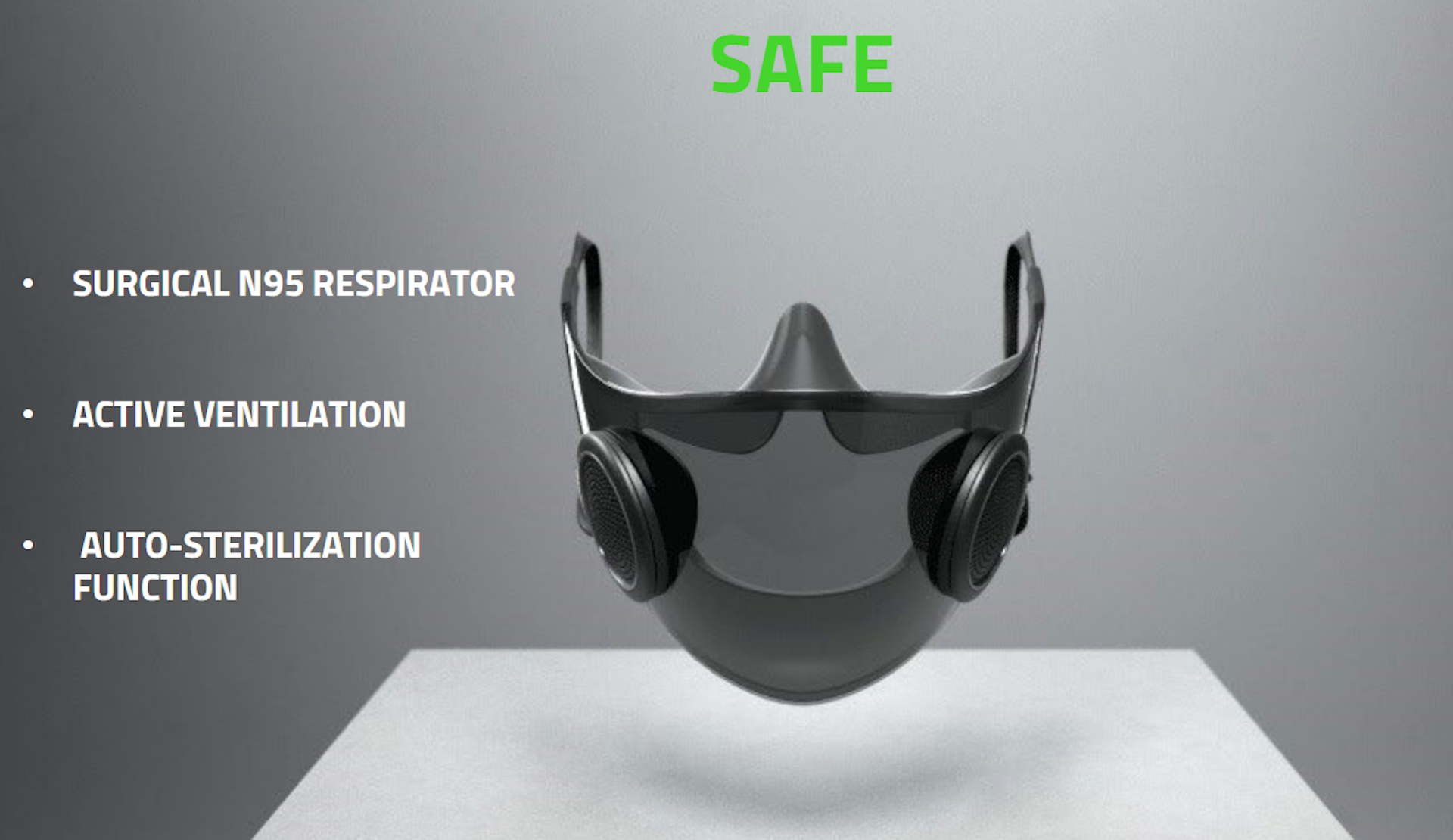Razer forced to pay more than $1M in refunds for its RGB 'surgical N95 respirators' that were not N95 respirators

Back in January 2021, at the peak of the Covid-19 pandemic, Razer unveiled Project Hazel, a “surgical N95 respirator” with—of course—RGB lighting. There was just one problem: The Zephyr, as it came to be known, wasn't actually N95 rated at all, and that little oversight is going to cost the company more than $1.1 million.
Concerns about the Zephyr's supposed National Institute for Occupational Safety and Health (NIOSH) rating surfaced a year after it was first announced, when specimens began appearing in public. Tech YouTuber Naomi Wu called out the lack of NIOSH certification, and our own hardware honcho Dave James noted in his appraisal of the device that, while it granted him a certain Bane-style drip, it is “not a medical grade mask designed to be worn in a hospital setting.”
Razer acknowledged when Project Hazel was first announced that it was not a medical grade mask, but the marketing materials billed it as a “surgical N95 respirator.” The company began removing the N95 labelling from its website once the complaints came to light, and says that it “proactively notified customers that the Zephyr was not a N95 mask, stopped sales, and refunded customers,” but that was too little, too late for the FTC, which has hit the company with a penalty of more than $1 million “to provide full refunds to consumers nationwide,” plus another $100,000 as a civil penalty.
The FTC said that while the Zephyr was promoted as an N95 mask, it was never actually submitted for testing by the FDA or NIOSH. Furthermore, the FTC alleged that “Razer only stopped the false advertising following negative press coverage and consumer outrage at the deceptive claims.”
“These businesses falsely claimed, in the midst of a global pandemic, that their face mask was the equivalent of an N95 certified respirator,” FTC Bureau of Consumer Protection director Samuel Levine said in a statement (via Kotaku). “The FTC will continue to hold accountable businesses that use false and unsubstantiated claims to target consumers who are making decisions about their health and safety.”
The full complaint filed by the FTC notes that Razer CEO Min-Liang Tan made multiple Facebook posts about the Zephyr mask, including one claiming “we've been getting the mask certified,” and another stating its filters “have been tested and certified for 99% BFE (bacterial filtration efficiency), the same standards for the most demanding medical grade masks out there.” The FTC said the statement “implied that a government agency certified the filter's performance,” but that never actually happened.
(Image credit: Min-Liang Tan (Facebook, via FTC))
Furthermore, the FTC alleges that while Razer knew the Zephyr did not meet required N95 standards, the company's senior director of regulatory and compliance ordered that disclaimers to that effect be removed from packaging just ahead of release. Internally at least, Razer seemed to point the finger at media coverage for improperly describing the Zephyr as an N95 mask, but the FTC said “Razer's explicit and implicit statements caused or contributed to that media coverage, and Razer made no attempt to correct any errors in media coverage until after the company faced significant backlash from the public and the media for its N95-grade claims.”

This was part of Razer’s own marketing campaign. (Image credit: Razer)
The net result for Razer is a settlement with the FTC to the tune of $1,071,254.33, “equal to Razer's revenue from the masks,” which the FTC will use to provide refunds to customers, and another $100,000 on top of that as a reminder not to do it again. It's a relative drop in the bucket—Razer reported full-year earnings of more than $1.6 billion in 2021—but it's not nothing. And Razer, understandably, isn't happy with the outcome.
“We disagree with the FTC's allegations and did not admit to any wrongdoing as part of the settlement,” a spokesperson said in a statement provided to PC Gamer. “It was never our intention to mislead anyone, and we chose to settle this matter to avoid the distraction and disruption of litigation and continue our focus on creating great products for gamers. Razer cares deeply about our community and is always looking to deliver technology in new and relevant ways.
“The Razer Zephyr was conceived to offer a different and innovative face covering option for the community. The FTC's claims against Razer concerned limited portions of some of the statements relating to the Zephyr. More than two years ago, Razer proactively notified customers that the Zephyr was not a N95 mask, stopped sales, and refunded customers.”




